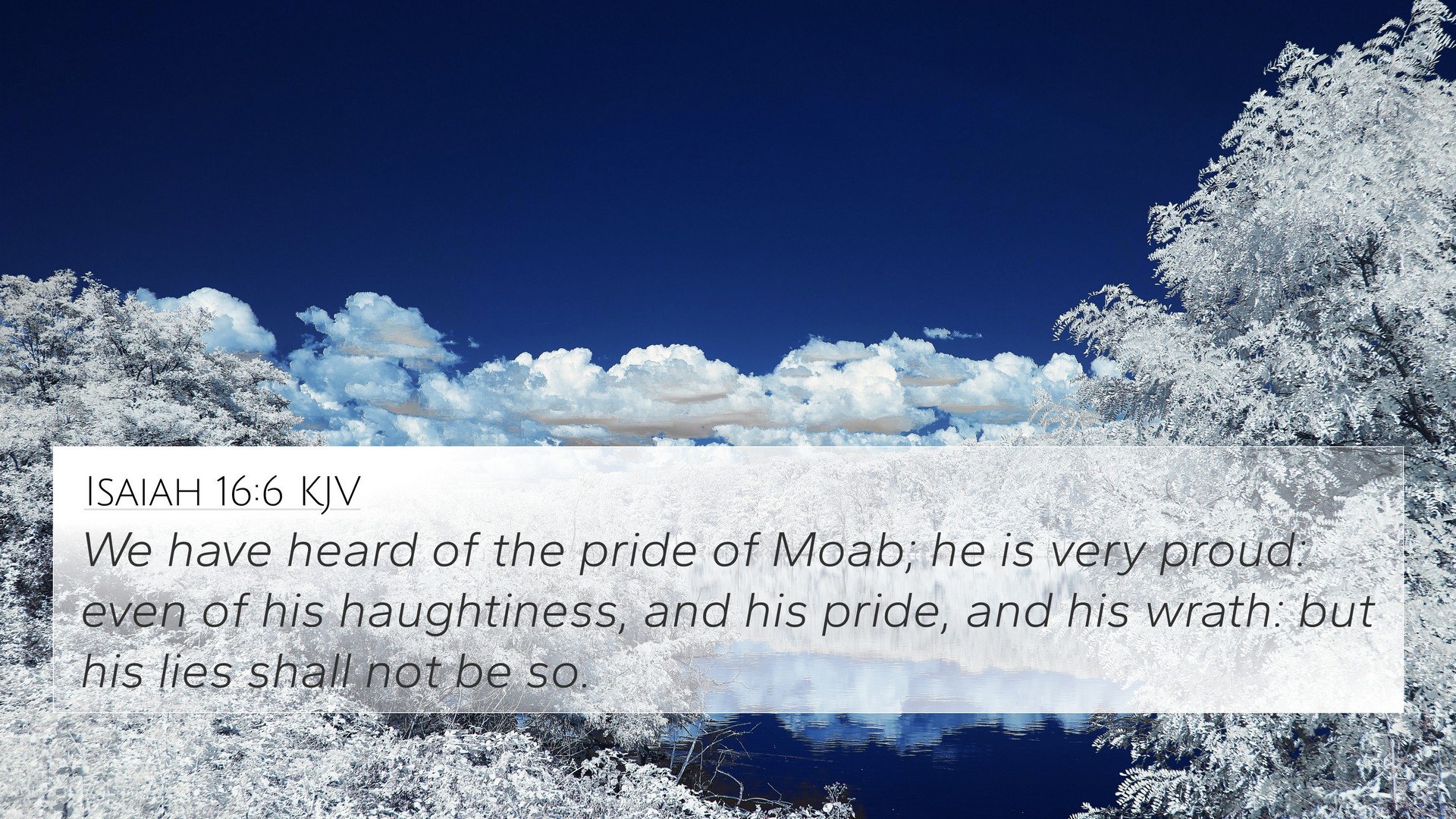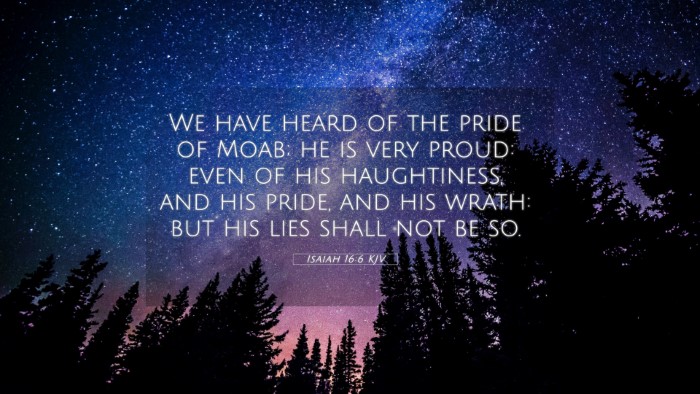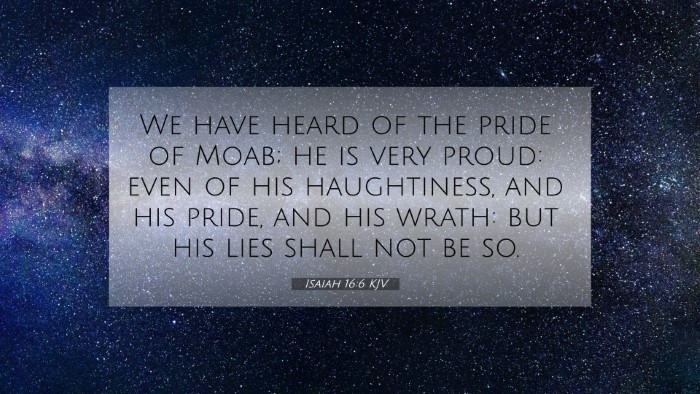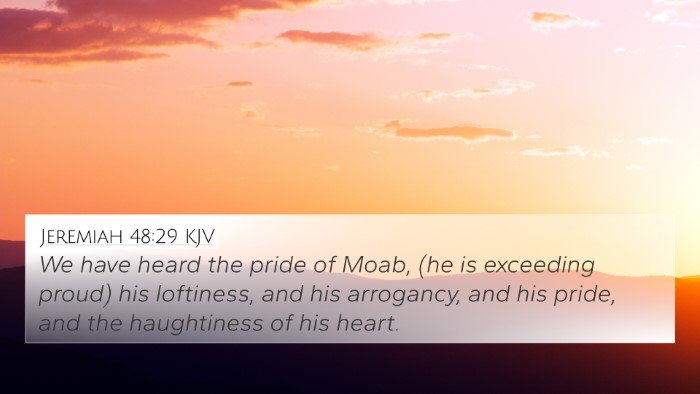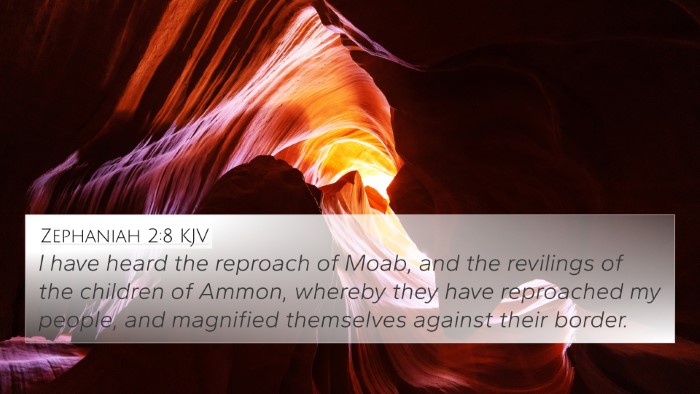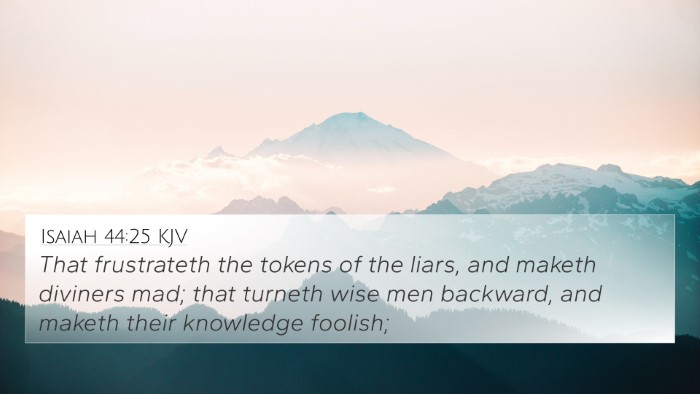Understanding Isaiah 16:6
Isaiah 16:6 states: “We have heard of the pride of Moab, he is very proud; even of his haughtiness, and his pride, and his wrath; but his lies shall not be so.” This verse provides insight into the character and moral condition of Moab during the time of Isaiah, emphasizing themes of pride, judgment, and the futility of falsehood.
Meaning of Isaiah 16:6
This declaration serves as a prophetic denunciation of Moab’s arrogance and self-confidence. The use of “pride” is highlighted multiple times, indicating the seriousness of this character flaw. According to Matthew Henry’s Commentary, pride is rooted in self-exaltation and leads to moral decay. Moab’s claims of strength and autonomy vanquish under the weight of divine judgment.
Insights from Public Domain Commentaries
-
Matthew Henry:
Henry points out that the Moabites, through their pride, show a deep disregard for God and moral truth. This pride manifests in their deceitful practices, suggesting that their inflated self-image is both harmful and ultimately self-destructive.
-
Albert Barnes:
Barnes elaborates on how this verse captures the essence of Moab's character. He emphasizes that Moab’s pride is an obstacle to genuine repentance and acknowledgment of God's sovereignty. The prediction of their judgment reveals that divine truth prevails over human arrogance.
-
Adam Clarke:
Clarke notes the repetition of terms like "pride" and "lies," suggesting that these are the central themes of Moab’s foundation. His commentary underscores that falsehoods and arrogance will ultimately lead to Moab's downfall as they cannot stand against God's truth.
Key Themes
The key themes in Isaiah 16:6 can be summarized as follows:
- Pride: The text warns against the perils of pride, which is often associated with a fall from grace.
- Judgment: It serves as a reminder of the coming judgment for nations that defy God.
- Truth vs. Lies: The verse emphasizes that deceit and lies cannot withstand God's abiding truth.
Bible Cross-References
Isaiah 16:6 can be cross-referenced with various other scripture passages that share similar themes:
- Proverbs 16:18: "Pride goes before destruction, and a haughty spirit before a fall."
- James 4:6: "God resists the proud, but gives grace to the humble."
- Psalms 10:4: "In the pride of his face the wicked does not seek him; all his thoughts are, 'There is no God.'
- Isaiah 2:11: "The haughty looks of man shall be brought low, and the lofty pride of men shall be humbled."
- Jeremiah 48:29: "We have heard of the pride of Moab - he is very proud of his loftiness and pride and arrogance." (A direct parallel to Isaiah 16:6)
- Ezekiel 28:17: "Your heart was proud because of your beauty; you corrupted your wisdom for the sake of your splendor." (A warning against pride)
- Luke 14:11: "For everyone who exalts himself will be humbled, and he who humbles himself will be exalted."
- Psalms 31:18: "Let the lying lips be mute, which speaks insolently against the righteous in pride and contempt."
Interpreting Biblical Themes through Cross-References
The interconnectedness of Biblical verses is a rich field for study. Understanding Isaiah 16:6 in the context of other scriptures can deepen insight into its themes of pride and judgment. For example, Proverbs 16:18 teaches how pride leads to destruction, further establishing the consequence of Moab’s arrogance.
Tools for Bible Cross-Referencing
Utilizing a Bible concordance or a cross-reference Bible study guide can enhance your understanding of similar biblical themes.
- Bible Concordance: A useful tool for finding cross-references based on specific keywords.
- Bible Cross-Reference Guide: Helps to identify related verses across both the Old and New Testaments.
- Cross-Reference Bible Study: A method for thematic studies linking various scriptures to draw comprehensive biblical insights.
Conclusion
Isaiah 16:6 serves as a profound reminder of the dangers inherent in pride and falsehood. The reflections provided by respected commentators and aligned scripture reinforce the necessity of humility before God. By engaging in comparative Bible verse analysis and utilizing cross-referencing tools, readers can uncover deep biblical truths and strengthen their faith through scripture exploration.
As you delve into the connections between Bible verses, consider how Isaiah 16:6 interweaves with other scriptures to become part of a comprehensive narrative about human nature, pride, and divine truth.
